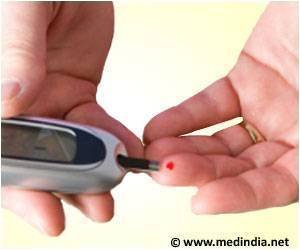Partner Violence and Child Abuse Raise Type 2 Diabetes Risk

Lead investigator Maureen Sanderson, PhD, Department of Family and Community Medicine, Meharry Medical College, explained, “While previous research has linked exposure to interpersonal violence with a higher risk for developing type 2 diabetes, our study is the first to confirm a consistent association among different genders and races within a large, diverse population. Moreover, we were able to establish the temporal sequence for experiencing violence and the subsequent risk of developing diabetes over time.”
Previous research has linked lifetime exposure to interpersonal violence or abuse to an increased risk of chronic psychosocial stress, anxiety, depression, and obesity. The investigators took a deeper look at the relationship between these factors, particularly obesity, and the risk of developing adult-onset diabetes using data from the Southern Community Cohort Study, a large study of an economically and ethnically diverse population in the southeastern US. More than 25,000 participants were contacted multiple times from 2002 to 2015, answering questions about partner violence (including adult psychological harm, physical violence, and threats), child abuse and neglect (physical, sexual, or emotional abuse), and current health (including diagnoses for adult-onset diabetes).
Co-investigator Ann Coker, PhD, Department of Obstetrics and Gynecology, College of Medicine and Center for Research on Violence Against Women, University of Kentucky, noted, “From this uniquely diverse cohort of over 25,000 participants, we saw that two commonly occurring forms of interpersonal violence, partner violence and child abuse (36% and 32%, respectively, in the study group), increased the risk of developing adult-onset diabetes by 20-35% when compared to individuals in this same cohort who had not experienced interpersonal violence.”
Increased Interpersonal Violence, and Obesity Amid COVID-19 Pandemic
Rates of interpersonal violence, psychosocial distress, and obesity all increased during the COVID-19 pandemic. Dr. Sanderson commented, “Our finding that lifetime interpersonal violence was associated with a significantly increased risk of developing diabetes across race and gender before the additional social stress of the COVID-19 pandemic strongly suggests the need for helping professionals across disciplines to implement effective violence prevention and intervention strategies to reduce the short- and long-term social and health consequences of partner violence and child abuse.”
Dr. Coker added, “The good news is that effective intervention and prevention resources exist that can help patients and communities prevent or reduce partner violence and child abuse/neglect and have an impact on health outcomes including type 2 diabetes.”
Preventing Violence: CDC’s Toolkit Empowers Clinicians and Communities with Strategies
The US Centers for Disease Control and Prevention’s National Center for Injury Prevention and Control provides toolkits for clinicians’ and communities’ use to prevent violence. Key strategies include strengthening economic supports for families, promoting social norms to protect against adversity and violence, ensuring strong starts for children, teaching skills, connecting youth to caring adults, and intervening to lessen harm.
In clinics, professionals can use safe, sensitive, trauma-informed approaches to ask patients about their current or lifetime experiences with child abuse or neglect and partner violence.
Source: Eurekalert
Source link
#Partner #Violence #Child #Abuse #Raise #Type #Diabetes #Risk



